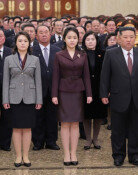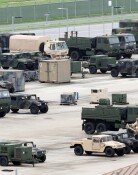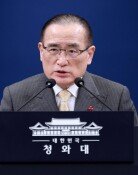"Enjoy Your Flight from Seoul to Jeju for 60,000 Won
"Enjoy Your Flight from Seoul to Jeju for 60,000 Won
Posted March. 15, 2005 22:25,
"100,000 won from Incheon to Osaka, 80,000 won from Busan to Shanghai, 70,000 won between Daegu and Beijing Are these really airfares?
With Jeju Air, the first low-fare airline in South Korea, officially starting business on March 25, and Cheongju Airport-based Hansung Airline applying for an irregular air freight business license to the Ministry of Construction and Transportation, local line-based low-fare small airline carriers have finally appeared in the Korean air transportation market.
In major contrast to Korean Air and Asiana Airlines, the two airlines monopolizing the local air transportation market, these new companies use less-than-80-men-capacity small airplanes, with discounts of 20-30% on airfares offered by existing airlines.
The larger airlines do not seem concerned about the emergence of competitors. Since most domestic routes are losing money, the larger airline companies do not care much about losing the domestic market to new entrants. What is a potential worry for Korean Air and Asiana Airlines is the possibility of competing with these small airline companies in the future for routes between neighboring countries. Like popular small-sized airliners in Europe and Southeast Asia, they worry these new local airliners might erode their market share before long.
When to Take Off?
Jeju Air, established by a 10 billion won and a 5 billion won investment, respectively, from Aekyung Group and Jeju Government, is planning to apply for a regular aviation business license in the first half of this year. The aircrafts will be purchased after comparing models from 6 companies worldwide, including Bombardier of Canada and ATR, an affiliate of France-based aircraft manufacturer Airbus.
A total of five new aircraft will be purchased, operating three local lines; Jeju-Gimpo, Jeju-Busan and Jeju-Daegu. Official business is scheduled to start around the first half of next year, following a hiring process for pilots, engineers, and flight attendants. Hansung Airline, established by retired employees from two major airliners, will purchase new aircrafts from ATR and expects operation to begin as early as this June, starting with Cheongju-Jeju and Gimpo-Jeju lines.
Strategy to Win Customers: Price, Price, Price
In order for these new startup airlines to succeed, the main marketing strategy should be cheap tickets. Current one-way airfare between Gimpo-Jeju line is 84,400 won from Korean Air, and the two new airlines say that their ticket prices will be 70~80 percent of the airfare. By emulating the strategies of successful low-fare airlines like Ireland`s Ryan Air, Britain`s EasyJet and Singapore`s Tiger Airlines, the companies expect that the cost of tickets can be substantially reduced for customers.
Strategies to reduce costs will follow familiar policies from other low-cost airlines: almost no service from flight attendants, no food, and no free baggage service; reservation only via web site; no seat allocation upon purchasing, first come, first served. With these seemingly extreme policies, foreign low-fare airline companies have been successful in offering tickets significantly cheaper than even ships or buses. Singapore`s Tiger Airline, for example, is now offering a one-way ticket between Phuket, Thailand and Singapore at 6.09 dollars.
The Key for Success: Discount and Creating New Demand
Airline industry experts say that the low-fare airlines` plan might fail unless they appeal to customers with significantly cheaper tickets. Simply offering tickets that are a little cheaper than competitors is not enough to draw customers` attention. Kim Je-cheol, a head researcher at Korea Transport Institute(KOTI), said, "In order for these low-fare airlines to be successfully on track, it is necessary that the government develop niche routes by connecting local airports such as Pohang, Ulsan, or Yeosu to Japan or China. It is also necessary that these companies continuously focus on cutting down costs.
Jin-Hup Song Hyo-Lim Son jinhup@donga.com aryssong@donga.com







